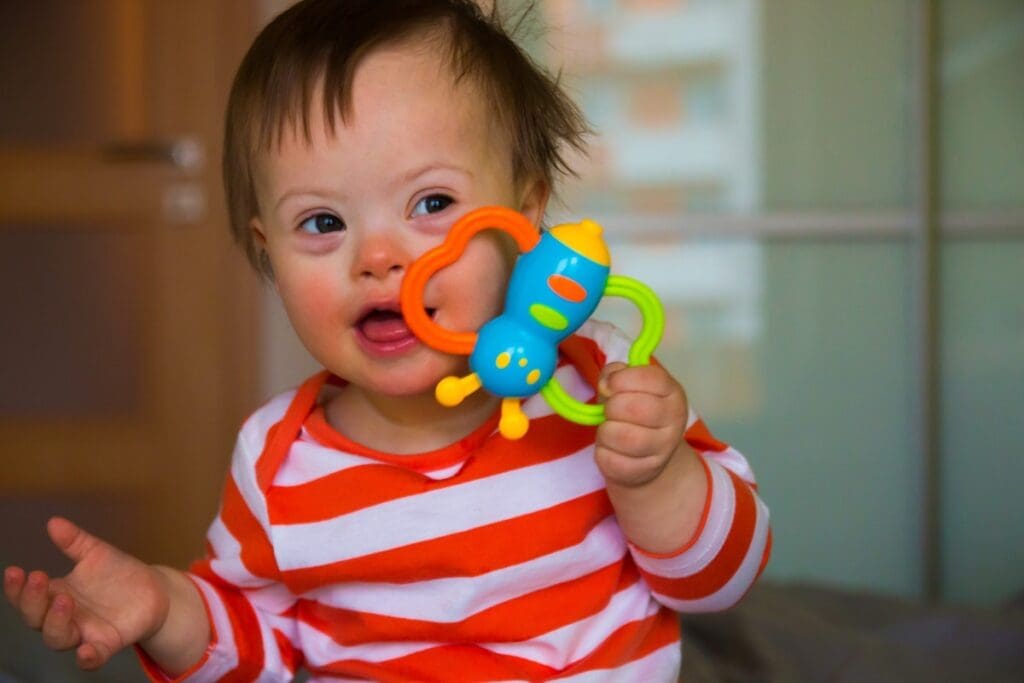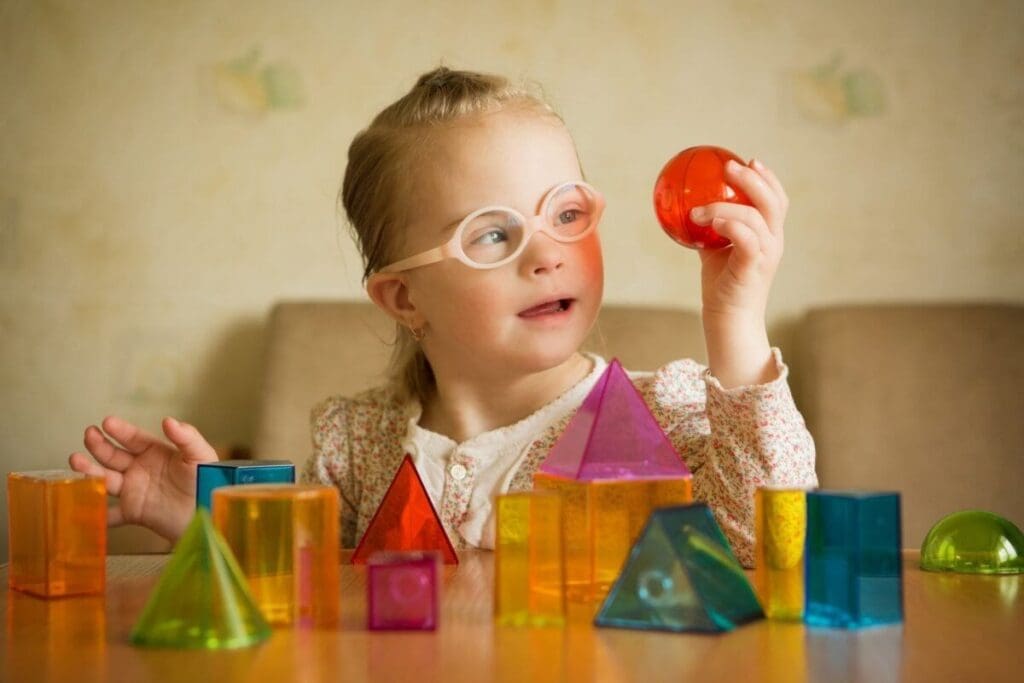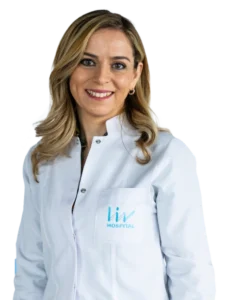Can a woman with Down syndrome have a baby? This question has sparked a lot of interest. We dive into the latest research on women with Down syndrome and their fertility. This condition affects about 1 in 700 births globally.
Recent studies show that women with Down syndrome can have children. But it’s not common. A report by ABC News says the odds are low. If they do have a child, there’s a big chance it will have Down syndrome too.

We’ll talk about how women with Down syndrome can have kids, the risks involved, and the need for support. Our aim is to offer the latest information and advice to families and healthcare professionals everywhere.
Key Takeaways
- Women with Down syndrome are fertile and can give birth to children.
- The chances of a couple with Down syndrome having a child are relatively low.
- If a couple with Down syndrome has a child, there’s a significant risk the child will also have Down syndrome.
- Comprehensive support systems are key for women with Down syndrome who are pregnant.
- Families and healthcare teams need to know the risks and offer the right care.
The Reproductive Capacity of Women with Down Syndrome
Women with Down syndrome have an extra chromosome 21. This affects their ability to have children in many ways. We will look into the challenges they face when trying to conceive.
Understanding Fertility Challenges
Women with Down syndrome often find it hard to get pregnant. While some can conceive, it’s less likely than for others. Fertility issues are complex, involving hormones and body structure.
These factors make it harder for women with Down syndrome to have children. It’s key to understand these when talking about their reproductive health.
Hormonal and Anatomical Factors
Hormonal and body structure problems can affect fertility. Women with Down syndrome might have irregular periods and hormonal issues. These problems can make it hard to ovulate.
- Hormonal imbalances affecting ovulation
- Anatomical abnormalities, such as issues with the uterus or fallopian tubes
- Other reproductive health issues

Statistical Rarity of Pregnancies
Pregnancies in women with Down syndrome are rare. Studies show a 35-50% chance of passing Down syndrome to a child. This highlights the need for genetic counseling for families.
Knowing the rarity and risks of pregnancies in women with Down syndrome helps. It aids in giving the right support and care.
Pregnancy Possibilities and Success Stories
Women with Down syndrome can get pregnant. It’s important to know how to care for them during pregnancy. Many things can affect their chances of getting pregnant, like their health and the support they get.
Documented Cases of Mothers with Down Syndrome
There are stories of women with Down syndrome having babies. Some babies have Down syndrome, and some don’t. This shows how important good medical care and support are during pregnancy.
Women with mosaic Down syndrome might have different chances of passing Down syndrome to their kids. Knowing the mother’s genes is key to understanding the pregnancy risks.
Required Medical Support and Monitoring
Pregnancies for women with Down syndrome need close medical monitoring. They might face health issues like heart problems and obesity. These are common in people with Down syndrome.
We stress the need for specialized prenatal care. This means regular visits, tests, and a team effort to handle any pregnancy problems.
Preconception Health Considerations
Before getting pregnant, women with Down syndrome should talk about the risks. They need to discuss their health, the chance of passing Down syndrome, and the support they’ll need.
Knowing what causes Down syndrome helps families get ready. Genetic counseling is a big help for families to understand risks and make choices.
Genetic Inheritance Risks for the Baby
Women with Down syndrome face a higher chance of passing it to their children. Down syndrome, or Trisomy 21, is caused by an extra chromosome 21. This genetic disorder poses significant risks during pregnancy.
Risk of Passing Down Syndrome
Studies show that women with Down syndrome have a 35-50% chance of passing it to their child. This risk is much higher than for the general population. For women with Down syndrome, the risk isn’t tied to their age but to the extra chromosome.
Types of Down Syndrome and Heritability
There are three main types of Down syndrome: Trisomy 21, Mosaicism, and Translocation. Trisomy 21 is the most common, where every cell has an extra chromosome 21. Mosaicism occurs when only some cells have the extra chromosome, leading to a milder form. Translocation Down syndrome happens when part of chromosome 21 breaks off and attaches to another chromosome.
The heritability of Down syndrome varies by type. While Trisomy 21 is usually not inherited, Translocation Down syndrome can be passed down from an unaffected parent who carries the translocated chromosome.
Importance of Genetic Counseling
Given the complexities and risks of Down syndrome, genetic counseling is key for families. Genetic counselors offer detailed information on risks, help families understand the implications, and provide support in making decisions about pregnancy and family planning.
Genetic counseling also covers reproductive options and support systems for a child with Down syndrome. This approach helps families prepare and make informed decisions.
Health Risks During Pregnancy for Women with Down Syndrome
Women with Down syndrome face many health risks during pregnancy. They need careful prenatal care. This is because they are more likely to have pregnancy complications.
Common Complications and Management
Pregnancies for women with Down syndrome are considered high-risk. They can face several complications. Some common issues include:
- Pre-eclampsia, a condition with high blood pressure and protein in the urine.
- Gestational diabetes, when the body makes less insulin during pregnancy.
- Thyroid disorders, more common in those with Down syndrome.
To manage these complications, a team of doctors is needed. This team includes obstetricians, cardiologists, and others. They work together to help the mother and baby.
Cardiovascular Concerns During Pregnancy
Heart problems are a big worry during pregnancy for women with Down syndrome. They often have heart defects from birth. So, it’s important to:
- Do detailed heart checks before and during pregnancy.
- Keep a close eye on heart health during pregnancy.
- Have a plan ready for any heart problems that might come up.
This way, doctors can lower risks and make pregnancy safer.
Specialized Prenatal Care Requirements
Women with Down syndrome need special prenatal care. This includes:
- Regular visits with a doctor who knows how to handle high-risk pregnancies.
- Tests to check for problems like diabetes and pre-eclampsia.
- A care plan that involves many specialists if needed.

With the right care, women with Down syndrome can have a healthier pregnancy.
Parenting Abilities and Support Systems
People with Down syndrome can be great parents with the right support. They need help with thinking and learning, family support, and knowing their legal rights. These things help them be good parents.
Cognitive and Developmental Considerations
Those with Down syndrome might face challenges in thinking and learning. Early help and ongoing support are key to teaching them parenting skills. They need to learn about taking care of kids, managing a home, and money matters.
They also need help in creating a safe and loving home for their kids. Special education programs can teach them how to be good parents.
Family and Community Support Networks
Having a strong support network is very important for parents with Down syndrome. Family, social services, and community groups can offer help and emotional support.
- Family can help with childcare and household tasks.
- Community groups can provide parenting classes and counseling.
- Social services can help with legal and financial issues.
As one parent with Down syndrome said, “A supportive family is key to caring for my child.” This shows how important a strong support system is.
“Supportive families and communities are essential in enabling individuals with Down syndrome to parent effectively.”
— Expert in Special Needs Parenting
Legal Guardianship and Parenting Rights
Knowing about legal guardianship and parenting rights is vital for those with Down syndrome. Laws about disabled parents vary, and legal guardianship might be needed for the child’s safety.
It’s important for them to get legal advice to understand their rights and duties. This helps them deal with legal issues and provide a stable home for their kids.
With the right support, people with Down syndrome can be loving and effective parents. They need cognitive and developmental help, strong family and community support, and to know their legal rights and duties.
Understanding Down Syndrome Prevalence and Risk Factors
Down syndrome is a common genetic disorder found in about 1 in 700 live births. It’s important to know about its prevalence and risk factors. Understanding Down syndrome helps in managing it better.
Current Statistics
Recent data show that own syndrome occurs in about 1 in 700 live births. This highlights the need for awareness among expectant parents. The risk factors for Down syndrome vary, but its prevalence has stayed relatively stable.
- The overall prevalence of Down syndrome is 1 in 700 live births.
- The risk of Down syndrome increases with maternal age.
- Advanced maternal age is a significant risk factor for Down syndrome.
Maternal Age Impact
Maternal age is a key factor in Down syndrome risk. The risk grows as the mother gets older. For example, at 25, the risk is 1 in 1,250, but at 40, it jumps to 1 in 100.
Maternal Age and Down Syndrome Risk:
- At 25 years, the risk is 1 in 1,250.
- At 30 years, the risk is 1 in 900.
- At 35 years, the risk is 1 in 350.
- At 40 years, the risk is 1 in 100.
Modern Screening and Diagnostic Approaches
Modern medicine offers several tests to detect Down syndrome during pregnancy. These include non-invasive prenatal testing (NIPT), ultrasound markers, and diagnostic tests like amniocentesis and chorionic villus sampling (CVS). It’s important for expectant parents to understand these options.
Early screening and diagnosis are key in managing Down syndrome. Expectant parents should talk to their healthcare providers to choose the best option for them.
Conclusion
Women with Down syndrome can get pregnant, but it’s a complex journey. They need careful medical attention. We’ve looked at how they can get pregnant and the risks of genetic problems.
At livhospital.com, we stress the need for strong support for those with Down syndrome. Our goal is to offer top-notch healthcare. We use the latest medical standards to help our patients.
Early help and support are key for people with Down syndrome to have happy lives. By understanding their needs and providing care, we can greatly improve their lives and those of their families.
FAQ
Can women with Down syndrome become pregnant?
Yes, women with Down syndrome can get pregnant. But, their fertility is often lower because of hormonal and physical reasons.
What are the risks of passing Down syndrome to the baby?
Women with Down syndrome face a 35-50% chance of passing it to their child. The risk depends on the type of Down syndrome.
What kind of medical support is required during pregnancy for women with Down syndrome?
Women with Down syndrome need special prenatal care. This includes regular check-ups and managing possible complications. They also need to watch out for heart issues.
Can women with Down syndrome raise their children?
Yes, with the right support, women with Down syndrome can be great parents. They need family and community help. It’s important to consider their cognitive and developmental abilities.
What is the prevalence of Down syndrome, and how does maternal age impact the risk?
Down syndrome happens in about 1 in 700 births. The risk goes up with the mother’s age. It’s 1 in 1,250 at 25 and 1 in 100 at 40.
What are the different types of Down syndrome, and how do they affect heritability?
There are several types of Down syndrome. These include Trisomy 21, mosaic, and translocation. Each type has different risks of being passed on.
Why is genetic counseling important for individuals with Down syndrome?
Genetic counseling is key. It helps understand the risk of passing Down syndrome to the child. It also talks about pregnancy options and what they mean.
What kind of support systems are essential for women with Down syndrome who become pregnant?
Women with Down syndrome need a lot of support. This includes medical care, family help, and community networks. It’s important for their and their child’s well-being.
References
Moran, P., et al. (2024). (In)fertility in Down syndrome. Reproductive Biology and Endocrinology, 22, 76. https://pmc.ncbi.nlm.nih.gov/articles/PMC11371124/























